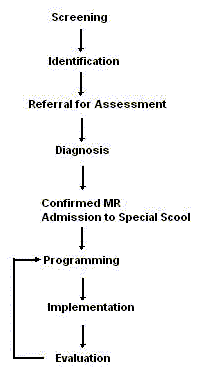| During admission we follow the
below procedure |
| |
 |
|
SPECIAL EDUCATION:
Special education is the functional educational. It’s Aim at
leading a child towards reduced dependence on others and provide
maximum personal, social and occupational competency.
We follow the BASIC – MR (Behavioral Assessment Scale for Indian
Children – Mentally Retarded) to assess the students
individually and fix the syllabus accordingly. On a quarterly
basis we evaluate the students’ achievement and re-fix the
syllabus.
In the vocational group we train them in cover making, hand work
materials, labon stems, Utensils Cleaning powder and Medical
cover.
In Every three months we conduct the parents meeting. In it we
elaborately discuss the improvement of the students and educate
them the future needs of kids according to their age.
PHYSIOTHERAPY:
In children with MR, One of the major concerns is the motor
problem. These children have problem in
1) Movement of parts of body.
2) Moving from place to place.
3) Maintenance of body posture.
4) Maintenance of body balance.
Generally these children with motor problems are categorized
into two broad groups,
1) Stiff child: Increased tone in the muscle, stiffness in
different parts of the body.
2) Floppy Child: Low tone in the muscle, Loose muscles and
Joints.
Physiotherapy used for decrease the stiffness, improve the
muscle strength & endurance and stimulation for floppy muscles.
We use NDT (Neuro Development Therapy) Technique.
EARLY INTERVENTION:
Movement and play experiences provide the foundation for the
development of motor, sensory, perceptual, cognitive, language
and social skills for infant and young children. For the infant
and young child with physical or other developmental delays,
these experiences are compromised. This means that parents and
professionals need to work together as a team to create
opportunities for movement and learning.
Early intervention is useful between 0 - 6 years children. In
our centre we follow “Portage Basic Training Principle” to
improve cognitive, social, motor and speech activities. Children
in and around Rajapalayam are getting benefit from this
technique.
SPEECH THERAPY:
There is nothing more elemental in all existence than
communication it is very essence of life. Disorders of speech
and language are found in a wide variety of conditions in which
mental retardation is a major one. Speech therapist role in the
field of mental retardation is four fold
1) Estimation of type and extent of speech and language
problems.
2) To plan and execute speech and language intervention
programs.
3) To plan and execute research in the concerned areas.
4) To take part in training programs for various professionals
in the field of Mental retardation.
On a fortnightly basis we give speech therapy to our school
students.
GROUPING:
In view of the gravity and seriousness of mental retardation and
the intricacies involved in the methods aimed at dealing with
it, a great care and caution has to be exercised while forming
the groups of children depending upon their level of I.Q. for
the purpose of their education and training. With the active
involvement of parents and trained teachers, we plan lessons to
be taught to them every week and keep on revising these lessons
off and on depending upon the progress of the children and, if
necessary, to keep on shifting a child from one group to the
other so that he finds the group congenial and education and
training meaningful.
Pre-primary Level: Skills imparted at this level are
eye-hand co-ordination activities, Motor, self help, language,
social skills and pre-academics.
Primary Level: The curriculum at this level which
includes personal adequacy skills, functional academics and
social competence.
Secondary Level: In this level, the skills developed at
primary level are further strengthened and emphasis is on
functional academics. Vocational skills and social competence
necessary for daily living such as time and Money concept,
readings sign boards and survival words and signing and
independent travel skills will form important components of the
curriculum.
Pre-vocational Level:
Here the emphasis should be on work skills and social
competence. Work routine, discipline, good manners and personal
skills such as appropriate grooming, shaving, and menstrual
hygiene and recreation skills form part of this group’s
curriculum. The skills such as money and time will be
strengthened at this stage.
MEDICAL HELP:
Anti-convulsion and muscle relaxant drugs are freely provided to
financially down rotten students.
|